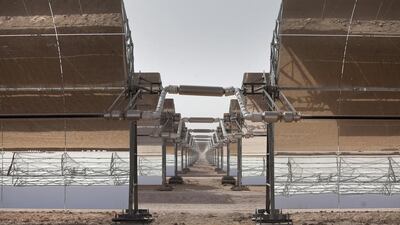Arabian Gulf countries stand to save as much as US$87 billion from lower oil and natural gas consumption if they achieve goals for renewables use by 2030, according to the International Renewable Energy Agency (Irena).
Meeting GCC targets for solar and other renewable energy could also create an average of 140,000 jobs a year, with 207,000 people employed in 2030, the Abu Dhabi-based Irena said in a 96-page report released on Wednesday.
The goals may already be pushed back, with Saudi Arabia, the largest of the GCC’s six member countries, delaying its target completion date for renewables by eight years to 2040.
Oil prices dropped almost 70 per cent in the past three years, prompting some Gulf countries to plan spending cuts or eliminate fuel subsidies. Renewable energy is taking on focus in the Gulf region as some GCC states can’t meet their own needs from traditional fuels because of growing demand, with the UAE turning to natural-gas imports, according to the report.
The savings of $55bn to $87bn by 2030 is equal to 2.5 billion barrels of oil equivalent, the Irena report showed. Carbon emissions could also be reduced by 1 gigaton by 2030, resulting in an 8 per cent cut in the region’s per capita carbon footprint, it said.
GCC countries Bahrain, Kuwait, Oman, Qatar, Saudi Arabia and the UAE comprise the world’s largest hydrocarbon-producing region, with about 30 per cent of its proven crude reserves and 22 per cent of gas, according to the report. Solar would account for 85 per cent of renewables jobs in 2030, with waste-to-energy at 14 per cent, Irena said.
Saudi Arabia’s programme shows solar contributing 76 per cent of its sustainable energy plans by 2040, with wind at 17 per cent.
Water use could be cut by 16 per cent in the power sector in the region, it said. In the UAE, fuel consumption in water and power industries could be cut 50 per cent if targets are met, according to the report. Fuel use would drop 23 per cent in Saudi Arabia and 21 per cent in Kuwait, it said.
Sales of crude, petroleum products and natural gas generated almost 80 per cent of total GCC government revenue in 2013, and regional energy consumption grew an average 5 per cent a year since 2000, faster than India, China and Brazil, Irena said. Saudi Arabia is the world’s largest crude exporter and Qatar the biggest shipper of liquefied natural gas.
business@thenational.ae
Follow The National's Business section on Twitter

